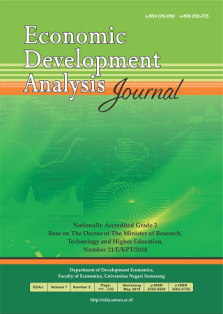Policy of Sharia Bank Indonesia Based on Vector Autoregressive Model.
Abstract
There are two shocking conditions in Sharia Bank Indonesia during 2020-2021. The first is the impact of COVID-19, which responded by the implementation of National Economic Stimulus as Countercyclical Policy, and second is a merger of state-owned Sharia Commercial Banks into one Bank. The study aims to elaborate the Bank's performance post implementing those policies using Vector Autoregressive (VAR) model. The variables obtained have been treated as endogenous variables consisting of ROA, NPF, Operations Expenses/Operation Income - BOPO, FDR, NOM, ratio of Fixed Yield Portfolios to Floating Yield Portfolios, and the changing of policy with data period June 2014 to February 2021. The result shows that based on Impulse Response, Variance decomposition, and Granger Causality, the shock in policy will be responded to by Sharia Banking performance in a short time (not more than four months) except for variable Fixed Yield Portfolios to Floating Yield Portfolios. The variable Fixed Yield Portfolios to Floating Yield Portfolios has a relationship (Granger Causality) to NOM, Operational Cost/ Operational Income, ROA, and Policy.


